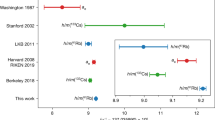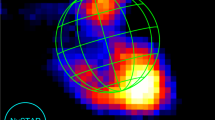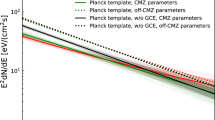Abstract
THE investigations made up to now on the radioactivity of potassium have brought to light a very inhomogeneous β-radiation. The absorption coefficients derived by various workers vary from 27.2 to 11.2 cm.2/gm., and it is difficult from these discordant data to deduce its spectral distribution; all one can say is that the velocity of the harder component, derived from absorption measurements, is about 0.82c. On the other hand, the feeble activity of the element does not admit of our using any of the methods of magnetic analysis, which has already given us accurate measurements of stronger radioactive radiations.
This is a preview of subscription content, access via your institution
Access options
Subscribe to this journal
Receive 51 print issues and online access
$199.00 per year
only $3.90 per issue
Buy this article
- Purchase on Springer Link
- Instant access to full article PDF
Prices may be subject to local taxes which are calculated during checkout
Similar content being viewed by others
References
G. Occhialini, Rend. Lincei. In the press.
Author information
Authors and Affiliations
Rights and permissions
About this article
Cite this article
BOCCIARELLI, D. A Hard Component of the β-Radiation of Potassium. Nature 128, 374–375 (1931). https://doi.org/10.1038/128374a0
Issue Date:
DOI: https://doi.org/10.1038/128374a0
Comments
By submitting a comment you agree to abide by our Terms and Community Guidelines. If you find something abusive or that does not comply with our terms or guidelines please flag it as inappropriate.



